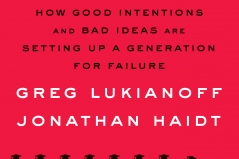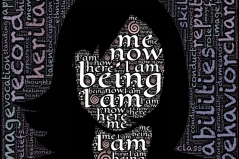Buried Secrets: Rememberance of Things Past, a Review by Christopher Perez
Buried Secrets: Rememberance of Things Past, a Review by Christopher Perez
Savi McKenzie-Smith, a child, adolescent, and adult psychotherapist, takes time in her book, Buried Secrets: Rememberance of Things Past – Learning to Live with Those Unwelcome Feelings, to lend h... / more
No Excuses! Lay Judges Reject Exhaustion as a Reason for Failing to Help Others
No Excuses! Lay Judges Reject Exhaustion as a Reason for Failing to Help Others
Imagine that your spouse has promised that they will wash the dishes cluttering your sink this evening; but, when they arrive home exhausted after a stressful day of back-to-back meetings and skipped meals, they try to pawn the responsibility back off on you. Would you soften your judgment of your spouse on account of their fatigue?
/ moreSocial Machines: Social Aspects of Human-Computer Interaction

keywords:
human-computer interaction / Turing-test / robot / artificial intelligence
Social Machines: Social Aspects of Human-Computer Interaction
Have you ever experienced the frustration of your computer not behaving as it should? Maybe it started to reboot during your most important meeting, or it simply froze and despite your best efforts, you couldn’t restart it. Take a moment to recall your reactions: how did you feel and behave? Did you mutter angry half-sentences? Did you shout at the machine in frustration? Did you threaten it that you will buy a new, better...
/ moreUnderstanding Online Child Sexual Abuse and How to Talk to Children About it
Understanding Online Child Sexual Abuse and How to Talk to Children About it
The new digital technology provides children with endless opportunities to explore and communicate. Still, it is important to prepare them for potential risks that they might encounter online, just as we prepare them for potential risks in the offline environment. In this article, you will learn how to create a safer online environment by talking to children about the internet and online sexual abuse.
On a cold winter morning in March 2013, a 13-year-old girl committed...
/ moreRisk assessment tools and criminal reoffending: Does bias determine who is “high risk”?
Risk assessment tools and criminal reoffending: Does bias determine who is “high risk”?
In The Netherlands in 1993, a man named Thomas was convicted of an arson in which no one was injured. Thomas was sentenced to four years in prison and involuntary treatment in a secure mental health facility. Based solely on professional opinion, Thomas was deemed too dangerous for release. If risk assessment tools had been available and used to evaluate Thomas, he would likely have been deemed a low risk to reoffend [1]. On the other...
/ moreThe Coddling of the American Mind, reviewed by Dylan Selterman
The Coddling of the American Mind, reviewed by Dylan Selterman
In their new book, The Coddling of the American Mind, Greg Lukianoff and Jonathan Haidt are sounding an alarm about a rising trend of emotional fragility in American culture. Specifically, they explain how this fragility manifests on university and college campuses, to the detriment of learning, academic freedom, discourse, and debate. The Coddling is an important and timely book, as our society is dealing with extremely challenging problems, and we will...
/ moreMy Year of Rest and Relaxation, reviewed by Andrew Archer
My Year of Rest and Relaxation, reviewed by Andrew Archer
“There she is, a human being, diving into the unknown, and she is wide awake.” (p. 289)
A Buddhist Analysis of My Year of Rest and Relaxation by Ottessa Moshfegh
Ottessa Moshfegh’s 2018 novel—My Year of Rest and Relaxation—is written as a retrospective, reflection of the narrator’s former self. The characters and details of the story are a critique of Western psychology—including psychiatry—and American culture. Buddhist philosophy is applied to analyze the narrator’s mission... / moreThe Quelling, reviewed by Katharine Coldiron
The Quelling, reviewed by Katharine Coldiron
Debut Novel Explores and Explodes Attachment Therapy
Barbara Barrow’s intriguing new novel, The Quelling (Lanternfish Press, September 25) explores a psychological treatment called attachment therapy. Although this innocuous name connects to attachment theory, which is legitimate, attachment therapy is controversial and dangerous, as the novel demonstrates ably. In The Quelling, two sisters, Addie and Dorian, are placed in a treatment facility as children and forced to...
/ moreRoadblocks to Mental Health Research
Roadblocks to Mental Health Research
 Another busy ward round: a telephone rings; a nurse apologises to patients that the ward is too short-staffed to facilitate their leave this afternoon; a junior doctor furiously types up their notes whilst simultaneously explaining to a healthcare assistant how to check the observation charts; there is a strong... / more
Another busy ward round: a telephone rings; a nurse apologises to patients that the ward is too short-staffed to facilitate their leave this afternoon; a junior doctor furiously types up their notes whilst simultaneously explaining to a healthcare assistant how to check the observation charts; there is a strong... / more
How to get into shape like the Hulk

keywords:
exercise / habits / health / self-regulation / self-control
How to get into shape like the Hulk
Do you want to get into shape but find it hard to carry out your good intentions? The Hulk can help you! 
After summer vacation, chances are you are trying to get back into shape. Your goals may include fitting into your pants again, training for a 5k in the winter, or improving your overall physical strength and endurance. Each day you try to start off with...
/ more







